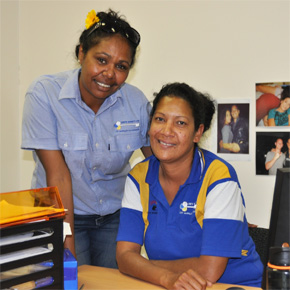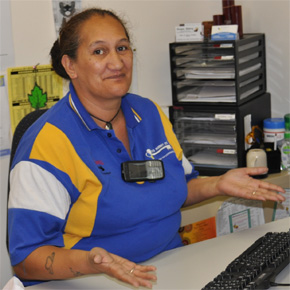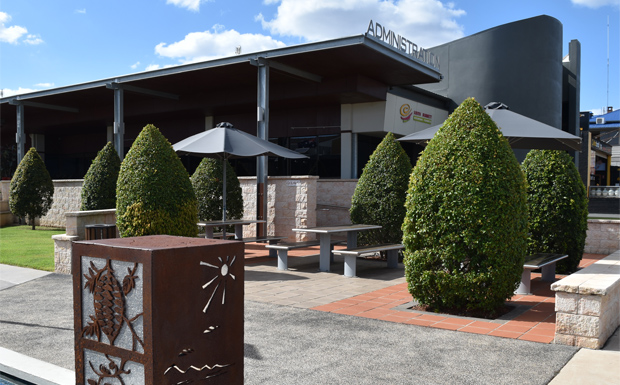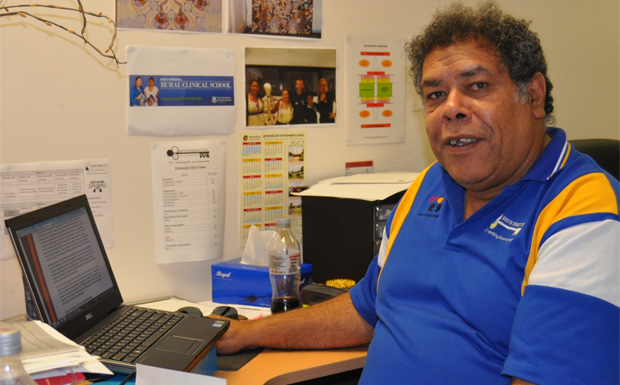
September 21, 2012
Packed into some quiet offices in Murgon’s Lamb Street is a service which people seem to agree has been having a positive effect on lives, but it could be facing the axe in December because there’s just not enough dollars in the State coffers to run it.
South Burnett CTC’s Diversionary Services works with the people that have some of the toughest needs: park drunks, young mums, ex-prisoners, homeless families.
Manager of Youth and Community Services Kirsten Firman said CTC still didn’t have any official notification that funding would not be renewed for the programs, however the six full-time staff and five casual staff had been warned their jobs may disappear soon.
“They are 100 per cent great staff,” she said. “CTC will try to place them within the organisation and will support them if they have to go somewhere else. We were always aware that it was three years funding, and then we got a six months’ extension, but we had an expectation that while the AMP was in place we would supply the support service.”
The AMP? The Alcohol Management Plan, or AMP, is State legislation which dictates what alcohol people can have in their possession within the shire boundaries of Cherbourg.
Critics of the AMP say it’s racist, but Murgon residents are also concerned it has simply shifted people’s drinking away from Cherbourg.
That’s where Diversionary Services stepped in three years ago: providing programs to address the problems in Murgon caused by the AMP in Cherbourg.
But it now appears likely Diversionary Services’ funding will expire in December but the AMP will continue. And people are worried.
Support workers fear deaths on the road as people try to walk the 7km back to Cherbourg in the dark, more domestic violence and shattered hopes and dreams; Murgon shopkeepers also fear drunks could return to their doorsteps.
Kirsten isn’t angry with the people making the funding decisions, she just thinks they don’t fully understand the complexity of some of the issues the residents of Cherbourg and Murgon face. And she’s very proud of the Diversionary Services’ staff.
“I’d like to acknowledge the amazing work these guys do in changing clients’ lives,” she said.
* * *
Diversionary Services Co-Ordinator Les Stewart is particularly worried about the future of CTC’s Street Patrol.
This late-night patrol escorts intoxicated people to a safe environment. Sometimes that’s back home, sometimes it’s to a relative’s house or sometimes it’s even to a police cell for a few hours if someone has been causing trouble.
The patrol was established as a direct result of the AMP. In practical terms, the AMP did nothing to encourage Cherbourg people who wanted to drink to limit their intake; it simply encouraged them to do all their drinking in Murgon.
But how do people get home when they’ve finished partying? With no public transport, it’s either walking, a taxi trip or sleeping it off in a park – a situation that both Murgon police and traders don’t like.
The CTC Diversionary Patrol was set up as a partial solution to this. The patrol has been running for three years and during that time it has earned the respect of its “passengers”, Murgon traders and police.
If it’s stopped, Les fears people may die.
“People will fall back to old habits. They’ll walk the road at night – and there’s no lights – or they’ll sleep in the doorways of shops,” he said.
Les said the Patrol has been running for 3 1/2 years and there have been zero incidences of trouble.
“The staff know the community and individuals, and know how to work with them,” he said.
“The Patrol has saved lives. It has stopped attempted suicides – even cut down one person when no one else was around. If we hadn’t been there they’d have been deceased. It has been flagged down by parents looking for their kids and we’ve found them.
“First up there was great apprehension in the non-indigenous community. We’re now seen as an agency that has broken down the barriers between the two communities.”
But CTC’s Diversionary Services is more than just the Patrol.
There are parenting programs, working with family groupings to try to rectify problems and find long-term solutions, mothers’ programs, healthy cooking, budgeting help, referrals for domestic violence assistance, and the “parkie” program.
Les is particularly proud of the “parkie” program which has been working with the park dwellers in the heart of town.
“They were just sitting around in the park all day,” he said. “The parkie program invited them in to have a meal. After a while and trust was established, we could ask them why they were out there and find out how we can assist them. Now they’re back with their families, connected with other programs.
“Their alcohol intake has dropped … their families have told us this. We’ve heard from members of the police that they’re no longer a problem. They’re back with their families, re-connected, grandfathers are back with their grandchildren.
“They had too much alcohol when they were younger and became lost. We have helped them get back their pride and dignity.”
There’s also the problem of IDs, which the Diversionary Services team has been tackling.
“We found even some of the younger guys, in and out of prison, didn’t have ID. They couldn’t even apply for JobSearch.”
Little by little things have changed in Murgon … even the relationship between Cherbourg residents and police.
“The partnership has really flourished. It’s sad, when Diversionary Services go, that relationship may go, too,” Les said.
Les is also worried about the potential impact the closure will have on other welfare services.
“We filled in a real gap in this community, tapping into other agencies to get better outcomes.
“We were just at the stage where we were helping people to get to the next stage of their lives, but we won’t have that opportunity now.”
* * *
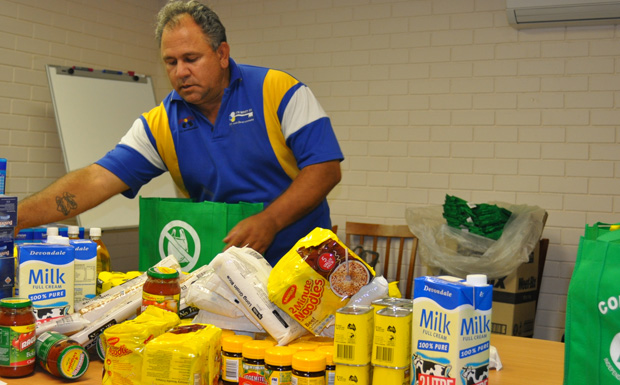
Barry Fisher is packing free food packs in a back room at Diversionary Services.
It’s simple, good nutritious food suitable for families with kids.
He’s been with the service for four years and enjoys what he’s doing. People come in looking for help and he chats with them.
“They’re allowed one pack every three months and we have a talk along the way,” he said.
This is an opportunity for people to learn about other services available in the community and for gentle suggestions about change.
After they’ve received their third pack, however, they get told they must show some proof of Centrelink deductions, ie proof of budgeting for rent, electricity, school fees etc.
There’s a real need … even with these rules in place, Barry hands out about 40 packs every month.
“These people are genuine, and the best thing I can do is listen,” he said.
He’s seen some success stories, too … people who used to regularly come in for help and now no longer need to.
Barry’s not sure what he will do if the program folds. He lives in Cherbourg and thinks he may take time off for a while and look after his children.
* * *
|
|
Albertha “Allie” Johannsson is a family support worker with Diversionary Services. She’s usually looking after about 15 young families.
During her two years with the program she has seen between 150-160 clients. She sees individuals aged over 18 or families as a group.
“I deal with clients on a holistic level,” she said. “I work with them and if they have other issues such as domestic violence or homelessness I can help to refer them on to other services.”
She started off with just three women, but the service grew by word-of-mouth … the best way to build trust.
Programs now include a playgroup, a “mums and bubs” swimming program, scrapbooking, and how to shop on a budget.
She helps with rental applications (both public and private) and contacts other towns to see what accommodation is available.
A regular “yarning circle” in the park gives the young mothers a time to discuss their problems with other women.
She also helps with what seems to be the perennial problem … lack of IDs. Without an ID, it’s impossible to get a driver’s licence or open a bank account.
The oldest client she’s had is aged just 24.
“The young mums tend to depend on me. I help them to bind with their families and the programs can give them a stress-free time where they can simply enjoy being with their kids,” she said.
Allie has seen her clients grow more confident and become more open about their problems.
She has also built up a good relationship with Child Safety and works with the women at times to understand exactly what the Department requires.
She also goes out and visits clients – at Cherbourg, Murgon, Wondai, Kingaroy and Gayndah.
“I’ve interacted with their partners as well, it helps to touch base with the men,” she said.
She’s afraid what’s going to happen now if the program ends.
“It’s heartbreaking to leave after we’ve established such good rapport with the community,” she said.
“We are going to have more domestic violence; they’re going to feel so insecure, so lost. They will feel isolated all over again. They’ll be saying: ‘Where are we going now? Who are we going to talk to?’
“We’ve been their mentors, a positive role model and given them an opportunity to believe in themselves, to say ‘I can do this’, ‘I can engage with my child and leave my problems at home for four or five hours’.”
* * *
Agnes is the women with the contacts … she’s the woman whom the “parkies” (her word) or “drones” (their word) trust.
Agnes Vaeagi is a family support worker with Diversionary Services and has been with them for two years.
When she first started she couldn’t help but notice the people who spent all day in Queen Elizabeth Park – the central park in Lamb Street, Murgon.
“The business people were talking about the havoc they were causing. How I saw it, all they needed was somewhere they could go and talk to someone about the issues they were facing, things like the overuse of alcohol, not taking care of themselves, not eating well,” she said.
“I put a little plan together and did it in little steps to gain their trust. I put on a lunchtime program Monday to Friday which CTC would provide … something hot like a cup of soup in winter and something cool, like sandwiches, in summer.
“I started off with three coming across the road and ended up with all of them! I realised the only regular meal they were getting was through here.”
As the men – aged from their 30s to 77 – started trusting Agnes, she started to work out what they needed … again IDs were a huge issue.
“People did not have Medicare cards or any basic ID,” she said.
As she worked with them to help sort out some of these issues they started trusting her “as one of the boys”. They told her their stories and shared with her their family backgrounds.
“I provided an outlet for the men to find their own solutions to their problems. I just sat back and shared lunch.”
Gradually she started a day program which was specially designed for them: fishing trips. And then they took her on a “culture trip”. All the time, people were talking and information was being shared.
They had a sense of pride as they explained where their “mobs” were from. Agnes discovered her new friends were from all over Australia – from Western Australia to the Central Desert, as well as Queensland. And they’d all ended up in a park in Murgon.
As their pride returned, some of the men decided to self-refer to detox programs. Others couldn’t stop drinking but all have cut back at a lot. Many have returned to their families.
“They’re staying out of trouble more. I asked a business person in the community in regards to the trouble that had been happening. She gave her views from the outside looking in and confirmed about the changes that have happened.”
Some of the men have now left Cherbourg / Murgon and have gone away working … even to the mines. But when life proves too much for them, it’s not unusual to find them back knocking on Agnes’ office door.
“They come back here to offload,” she said. “Otherwise they might turn back to the bottle.”
When the “parkies” first came over, they were rude, abrupt and loud. Now they’re very respectful.
It takes time to make a change. And an individual must make the changes themself.
“Through CTC we provide the tools for them. We don’t harass them,” Agnes said.
“They pick up a brochure and then they’ll say ‘Do you think that’s good for me?’ and that tells me that they do care about themselves.
“It’s sad. The hardest part is letting them know the service is going to wind up. They will be crushed. I have told just one and he said “Effing great. Here we go again.’
“I didn’t know how to answer that.”






